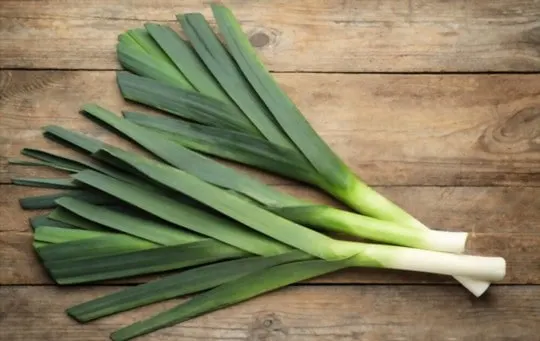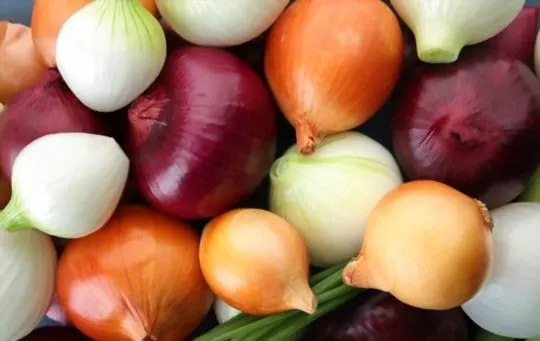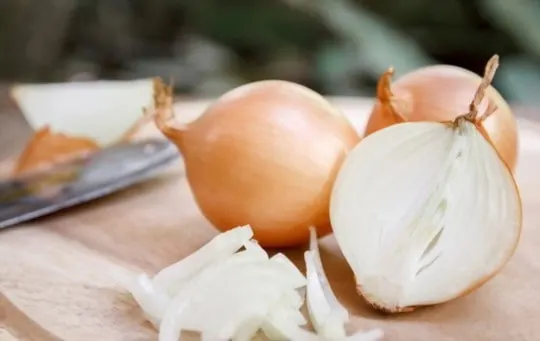In the kitchen arena, two veggies often go head-to-head. Leeks and onions. These staples hold the fort in flavor town.
Leeks, with their milder, sweeter charm, might seem like the underdog. Yet, they’ve got a fan club for their subtlety in dishes. Onions, on the other hand, are the bold contenders. They pack a punch and are nearly in every recipe we swear by.
We’ve had our share of “oops” moments swapping these two. Ever had a quiche turn into a tearjerker? That’s onions for you, folks.
Deciding which one takes the crown in our kitchens isn’t a walk in the park. Stick around as we deep-dive into this veggie saga.

What are Leeks?

Leeks are a type of vegetable that belong to the Allium family, much like onions and garlic.
These long, cylindrical vegetables have a white bulb at their base, with green leaves at the top.
They have a mild, sweet onion-like flavor and are commonly used as an ingredient in soups or stews.
In terms of nutrition, leeks are a good source of fiber, vitamins C and K, as well as folate and iron.
Due to their low calorie content, they can be included in weight loss diets without compromising on nutrients.
What are Onions?

Onions are bulb-shaped vegetables with layers of papery skins and fleshy leaves that surround a juicy core.
These are widely used for their pungent flavor and aroma in almost every cuisine across the globe.
The versatility of these veggies introduces them into different dishes, either raw, cooked, sautéed, grilled or roasted.
Onions come in various sizes, shapes, colors like white, yellow, red and pink with different tastes accommodating to different preferences.
Additionally, onions have several health benefits apart from being a flavor enhancer in our diets.
They are rich in antioxidants that fight free radicals in our body leading to the prevention of various diseases including cancer.
Moreover, they provide medicinal properties like antimicrobial effects preventing tooth decay and gum problems.
Due to its antibacterial nature; it’s also beneficial in treating colds and other respiratory ailments.
Differences Between Leeks and Onions

Leeks and onions are two vegetables that are commonly used in cooking.
The differences between them go beyond their appearance and taste.
Leeks have a milder and sweeter flavor than onions, and they have a more delicate texture.
Onions, on the other hand, have a stronger and pungent flavor which makes them suitable for savory dishes.
In terms of nutrition, both vegetables are low in calories and high in vitamins, but leeks contain more antioxidants than onions.
Appearance and Structure
Leeks and onions have a comparable appearance, but their structures differ significantly.
Leek leaves are long and flat, while the stem is white and provides ample nutrition.
In contrast, onion bulbs have papery skin covering an edible layer that is made of concentric rings.
In terms of structure, leeks are milder in taste than onions due to lower sulfur levels contained in them.
However, leeks take longer to cook fully.
The green part of the plant has more flavour than the white part which can be cooked with many other ingredients to bring out its unique taste.
Cooking onion releases its spice aromas and also hints at sweetness that enhance dishes too.
Interestingly, these vegetables share several similarities regarding their health benefits since they contain nutrients like vitamin C and dietary fiber that help prevent chronic diseases while also improving digestion.
Nonetheless, depending on the individual’s nutritional needs or preference for stronger or weaker flavors in recipes will determine which is best suited for specific purposes related to cooking styles.
Flavor Profile and Taste
Leeks and onions are two similar vegetables that taste quite different from each other.
Leeks have a milder, sweeter flavor compared to onions, despite belonging to the same Allium family.
The taste of leeks is subtler and more delicate, with notes of sweetness and a slightly herbal undertone.
On the other hand, onions have a pungent, strong flavor with a characteristic tanginess.
They contribute to the overall taste of any dish and tend to overpower other ingredients if not cooked tenderly.
Regarding their texture, leeks bring out a velvety and silky mouthfeel in dishes; they create smoothness in soups and stews, whereas onions provide crunchiness when added raw in salads or sandwiches.
It’s worth noting that both can be used interchangeably in most recipes depending on personal preferences, but the resultant taste will vary considerably.
Ultimately, the decision between using leeks or onions comes down to what you’re using them for and what flavor profile you want to create in your dish.
In recipes where subtlety is required such as those for fish dishes or risotto, leeks are ideal choices due to their softer taste compared to onions’ powerful one.
Whereas if you aim for bold flavors supported by recipes such as meaty stews or sautéed vegetables then use onions since they add depth of flavor along with crunchiness.
Nutritional Differences
Leeks and onions have unique nutritional profiles that differentiate them from each other.
Leeks are a good source of vitamins A and C, while onions offer more fiber and antioxidants.
Both vegetables also contain flavonoids, which have anti-inflammatory and anticancer properties.
Despite their similarities, leeks and onions differ in their taste and culinary applications.
Leeks have a milder flavor than onions, making them suitable for dishes that require subtler onion flavors like soups, stews, and quiches.
On the other hand, onions have a stronger taste that enhances savory dishes’ tastes like pizzas, curries, and stir-frys.
By incorporating both vegetables in your diet regularly, you can enjoy their unique health benefits while adding variety to your meals.
Culinary Uses and Versatility
Leeks and onions are both members of the allium family and possess distinct yet versatile culinary uses.
These vegetables possess unique flavors; leeks are milder and sweeter, while onions have a pungent taste.
Both can be used in cooked or raw dishes to add flavor, texture, and color to meals.
Leeks have a slightly sweet flavor profile that is perfect for soups, stews, sautés, and baked dishes.
Interestingly, they substitute well for onions in recipes where a milder onion taste is necessary.
Additionally, their white and green parts may be used interchangeably, making them a more economical option when preparing meals.
On the other hand, onions provide a pungent taste that adds depth to entrees such as stir-fries or roasted meats.
Their high sugar content caramelizes when cooked down and offers a dynamic layer of flavor to recipes such as French onion soup or onion rings.
While both vegetables offer distinctive tastes and texture profiles in various dishes, it ultimately depends on personal preference and recipe requirements which one to choose over the other.
Similarities Between Leeks and Onions

Leeks and onions share many similarities because of their biological classification.
Both belong to the Allium family, which includes garlic and shallots.
They also have similar nutritional profiles, with both providing a good source of vitamins A and C, as well as potassium and fiber.
Additionally, both vegetables are used in a variety of dishes for flavoring purposes due to their strong taste and aroma.
One significant similarity between leeks and onions is their versatility in culinary applications.
Chefs use them as a foundation for soups, stews, and sauces or even sauté them in savory dishes to add texture.
Another commonality is that they can be grown in various climates worldwide.
Although leeks and onions share many similarities, one notable difference between these two vegetables is their appearance.
Leeks have long green leaves that wrap around a white stalk whereas onions are round bulbs covered with thin papery skins.
While leeks have a sweet, mild flavor as compared to onions’ pungent taste.
Factors to Consider When Choosing Between Leeks and Onions
Leeks and onions are both versatile vegetables used in various cuisines.
When making a decision between these two alliums, several factors should be considered.
First, leeks have a more delicate flavor and texture compared to onions.
Second, leeks tend to be milder than onions and complement recipes that require subtler herbs.
Third, when it comes to size, leeks are larger compared to regular onions.
Additionally, the cooking method plays a role in the decision-making process.
While onions are commonly used in sauteing due to their sharper flavor profile, leeks work well in soups, stews or even roasted for an added sweetness similar to caramelized onions.
Finally, when determining which food is best nutritionally for you, keep in mind that leeks have higher levels of carotenoids while onions contain more Vitamin C.
Recipes and Cuisines
When it comes to diverse flavors and cuisines, the ingredients we choose are crucial in bringing out the desired taste and aroma.
Different regions have their own unique food culture, which is defined by specific ingredients or combinations of them.
In this section, let’s explore the role of ingredients in creating a diverse range of recipes and cuisines.
In many cultures, food is prepared using staple ingredients that impart a distinct flavor to dishes.
These could range from vegetables like leeks and onions to specific spices and herbs.
Such staples not only provide essential nutrients but also add depth to the dishes they are used in.
They vary in texture, color, taste as well as aroma, influencing thousands of recipe variations globally.
Leeks and onions are common staples found across various cuisines around the world.
While they might look similar at first glance, there are subtle differences in their taste and texture that make them effective for different kinds of cooking styles.
For instance, leeks have a milder flavor than onions but offer a more distinctive sweetness when cooked for longer periods.
Onions add pungency to a dish which suits strongly flavored meals like stews or curries.
To create many diverse recipes and cuisines worldwide, it is essential to understand the key elements that make up each ingredient’s flavor profile.
From basic staples like leeks and onions to more complex ingredients such as rare spices or exotic fruits – all contribute to an intricate web of culinary expertise and creativity that drive global food trends.
Texture and Cooking Techniques
Leeks and onions vary in texture and can be prepared using different cooking techniques.
Leeks are slightly softer than onions, making them more delicate.
They can be used in broths, soups or stir-fries without becoming mushy.
Onions have a firmer texture and hold up well during long cooking times such as caramelizing, grilling or sautéing.
Each vegetable requires different techniques to draw out its unique flavor profile.
Leeks should be thoroughly washed while onions need to be sliced correctly to ensure maximum flavor extraction.
Both vegetables provide distinct tastes to dishes and can be utilized in different manners according to the cook’s preferences.
Health Benefits and Dietary Preferences
Rich in vitamins and minerals, leeks and onions are both healthy options.
However, their nutritional compositions differ slightly.
While leeks have higher levels of Vitamin K and A, onions contain more Vitamin C and folate.
The dietary preferences also differ as some may prefer the milder taste of leeks while others may prefer the pungent flavor of onions.
Ultimately, choosing between the two depends on personal preference and the specific dish being prepared.
Conclusion
Comparing leeks and onions in terms of their nutritional value and taste can be difficult since both are excellent vegetables for use in cooking.
However, based on their respective qualities, leeks may be a better option for some people.
Leeks have a sweet, mild flavor that is less assertive than onion and contain more vitamin K, which helps to promote bone health.
In addition, leeks contain compounds that are helpful in reducing inflammation and protecting against chronic diseases such as cancer.
Therefore, choosing leeks over onions may provide unique benefits to one’s overall health.

Leeks vs Onions: Which is a Better Option?
Ingredients
- Leeks
- Onions
Instructions
- Choose between two items based on your preference and availability.
- Follow the cooking directions for your chosen option, using the appropriate ratio of ingredients.
- Prepare it according to your desired recipes.
- Incorporate them into your dish, adjusting the amount to suit your taste.
- Enjoy the unique taste experience and experiment with different dishes to explore their versatility.

Andrew Gray is a seasoned food writer and blogger with a wealth of experience in the restaurant and catering industries. With a passion for all things delicious, Andrew has honed his culinary expertise through his work as a personal chef and caterer.
His love for food led him to venture into food writing, where he has contributed to various online publications, sharing his knowledge and insights on the culinary world. As the proud owner of AmericasRestaurant.com, Andrew covers a wide range of topics, including recipes, restaurant reviews, product recommendations, and culinary tips.
Through his website, he aims to inspire and educate fellow food enthusiasts, offering a comprehensive resource for all things food-related.

Leave a comment